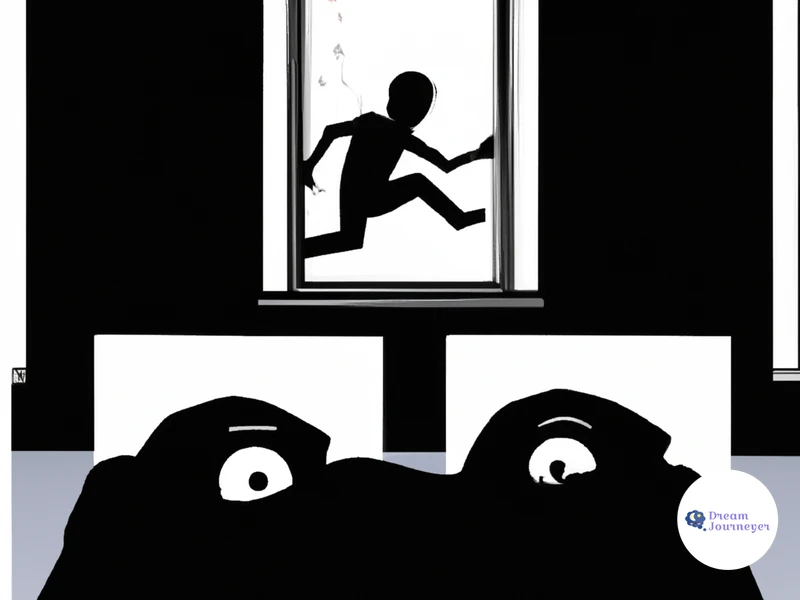We all dream from time to time, and while some dreams are pleasant and uplifting, others can be downright terrifying. If you have a dream about witnessing a murder, it can be a very frightening experience. Fortunately, there are ways to handle fearful nightmares such as this and make them less frequent. This article will discuss how to handle dreams about witnessing murder, so you can begin to manage your fears and nightmares.
What is a Witnessing Murder Nightmare?

A witnessing murder nightmare is a type of dream in which the dreamer experiences witnessing a murder. These dreams can be extremely vivid and emotionally intense, often leaving the dreamer in a state of fear and distress. The dreamer may feel as though they are in danger and may be unable to move or wake up. In some cases, the dreamer may even feel as though they are the victim and may experience physical sensations associated with the crime, such as pain or shock. The dream may also involve a feeling of helplessness and guilt, as the dreamer is unable to stop the crime from taking place.
Causes of Witnessing Murder Nightmares
Stress
Stress can be a major cause of nightmares, including those involving witnessing murder. Stressful events, such as the death of a loved one or a traumatic experience, can trigger nightmares. It is important to remember that nightmares are a normal reaction to stress and can be addressed with proper self-care.
Trauma
Trauma can also cause nightmares involving witnessing murder. Trauma can be the result of a single event, such as a car accident, or the result of a series of events, such as abuse. Trauma-related nightmares can be recurring and can be difficult to manage. It is important to seek professional help if you are struggling with trauma-related nightmares.
Post-Traumatic Stress Disorder
Post-Traumatic Stress Disorder (PTSD) is a mental health disorder that can cause nightmares involving witnessing murder. People with PTSD may experience recurring nightmares and may have difficulty managing the fear and anxiety associated with them. It is important to seek professional help if you are experiencing PTSD-related nightmares.
How to Handle Fearful Nightmares

Understand the Nightmare is Not Real
Facing a nightmare can be a terrifying experience, and the fear they can evoke can be hard to shake. However, it is important to remember that a nightmare is just a dream and is not actually real. The fear of a nightmare is only in the mind, and it is possible to consciously process and let go of the fear.
Practice Good Sleep Hygiene
Good sleep hygiene is an important part of managing nightmares. Establishing a consistent bedtime routine, avoiding caffeine and alcohol before bed, and making sure the bedroom is dark, quiet, and comfortable can help reduce the frequency and intensity of nightmares.
Seek Professional Help
If nightmares continue to be a problem, it is important to seek professional help. A health professional can help people identify the source of their nightmares and provide strategies for managing them. They can also refer people to a therapist, who can help manage the emotional and psychological effects of nightmares.
Coping Strategies
Talk to Someone
Talking to a trusted friend, family member, or mental health professional can help you to process the fear that comes with dreaming about witnessing a murder. It can help to feel supported and to know that you are not alone. Talking can also help you to explore the underlying anxiety that may be causing such a dream.
Ground Yourself in the Present Moment
When the dream ends, it is important to ground yourself in the present moment and remind yourself that you are safe. This can involve focusing on the sensations of your body, such as your feet on the ground or your breath moving through your body. It can also help to look around the room and take in the sights and sounds of your current environment.
Create a Safety Plan
Creating a safety plan can help to reduce the fear associated with such dreams. This plan might include writing down your feelings and thoughts about the dream, or even writing down mantras that help you to feel more secure. It can also help to create a plan for how you will respond if such a dream happens again.
Practice Relaxation Techniques
Relaxation techniques such as deep breathing, progressive muscle relaxation, and mindfulness can help to reduce the fear associated with such nightmares. It can also help to find a safe space in the home to practice these techniques, such as a bedroom or a bathroom. Practicing relaxation techniques can help to reduce the fear associated with such dreams and create a sense of safety and security.
Benefits of Dealing with Witnessing Murder Nightmares

Managing Fear: Dealing with nightmares of witnessing a murder helps in managing fear and anxiety associated with the trauma. It helps in understanding the emotions and addressing them in a healthy way.
Healing: Working through nightmares helps in healing and working through trauma. It helps in identifying the underlying causes of fear, anxiety and post-traumatic stress.
Reducing Stress: Nightmares can be very stressful and dealing with them helps in reducing stress levels. It helps in finding ways to cope and move forward.
Building Resilience: Working through nightmares helps in building resilience and improving mental health. It helps in developing healthy coping mechanisms and learning new ways to manage fear.
Self-Empowerment: Dealing with nightmares of witnessing a murder helps in gaining self-confidence and self-empowerment. It helps in understanding the impact of the event and finding ways to move forward.
Tips for Coping with Witnessing Murder Nightmares
- Understand the root cause: It is important to understand the root cause of the nightmares. It could be due to trauma, fear, stress, or anxiety. It is best to discuss with a professional to determine the cause and get appropriate help.
- Dealing with feelings: It is important to identify the feelings associated with the nightmare and find ways to cope with them. Talking to someone about the nightmare and its feelings can help. Talking to a therapist or counselor can be beneficial.
- Self-care: Taking care of oneself is important in order to cope with nightmares. This includes getting enough sleep, eating healthy, exercising, and taking time to relax.
- Avoid triggers: Identifying and avoiding triggers is important in order to reduce the number of nightmares. Triggers can include certain places, activities, or people that remind one of the traumatic event.
- Replace negative thoughts: It is important to replace negative thoughts associated with the nightmares with positive ones. This can be done through meditation, visualization, and positive affirmations.
- Therapy: Seeking professional help from a therapist or counselor can be beneficial in order to cope with nightmares. They can help to identify the root cause and provide strategies to cope with the nightmares.
Frequently Asked Questions
What can I do if I have difficulty sleeping after having a nightmare about witnessing murder?
Practice relaxation techniques such as deep breathing and progressive muscle relaxation. Talk to a trusted friend or family member about your dream and feelings. Try to engage in comforting activities such as reading or listening to soothing music. Create a sleep routine and keep it consistent. Make sure to have a comfortable sleeping environment with no screens or electronics. Avoid caffeine, nicotine, and alcohol before bed, as these substances can increase sleep difficulties. Consider seeking professional help if symptoms persist.
What are some techniques I can use to help reduce my anxiety when having a nightmare?
- Reassurance: Remind yourself that the nightmare is not real.
- Relaxation: Take deep breaths, close your eyes and relax your muscles.
- Distraction: Focus on something positive, such as a happy memory or a favorite activity.
- Imagery Rehearsal Therapy: Visualize yourself in the nightmare in a different way, such as having the power to control the events.
- Meditation: Practice mindful meditation to help focus on the present moment and distract yourself from the nightmare.
- Cognitive Behavioral Therapy: Talk to a mental health professional to help understand and process the fear associated with the nightmare.
Is it Normal to Have Nightmares About Witnessing Murder?
Yes, it is normal to have nightmares about witnessing murder. It is a very upsetting experience and can be a sign of the fear and distress that the individual is feeling. Nightmares about witnessing murder can be a sign of unresolved trauma or an unresolved fear. It is important to take steps to deal with these nightmares in order to reduce fear and restore a sense of safety.
Are there any Psychological Effects of Having Nightmares about Witnessing Murder?
Having nightmares about witnessing murder can have a range of psychological effects, such as fear, anxiety, depression, and post-traumatic stress disorder (PTSD). Nightmares about witnessing murder can also affect sleep quality, leading to increased fatigue and difficulty concentrating. Additionally, nightmares about murder can lead to feelings of guilt or responsibility, and cause a person to become more alert and vigilant, leading to increased stress and agitation.
How can I prevent myself from having nightmares about witnessing murder?
Practice relaxation techniques such as deep breathing, yoga, and progressive muscle relaxation. Develop a consistent sleep routine and limit exposure to screens and intense stimulation before going to bed. Consider writing down your worries and fears before bed to help clear your mind. Avoid consuming caffeine, alcohol, and nicotine before bed as they can increase nightmares. Talk to a mental health professional if the nightmares are causing distress or if they are related to a traumatic event.
Conclusion
It is important to remember that fearful nightmares, such as dreaming about witnessing a murder, are often our subconscious trying to communicate with us. By exploring the dream, we can gain insight into our own fears and anxieties. Seeking out the help of a qualified therapist or dream specialist can help us to identify the underlying causes and take steps to manage our fears and nightmares.






